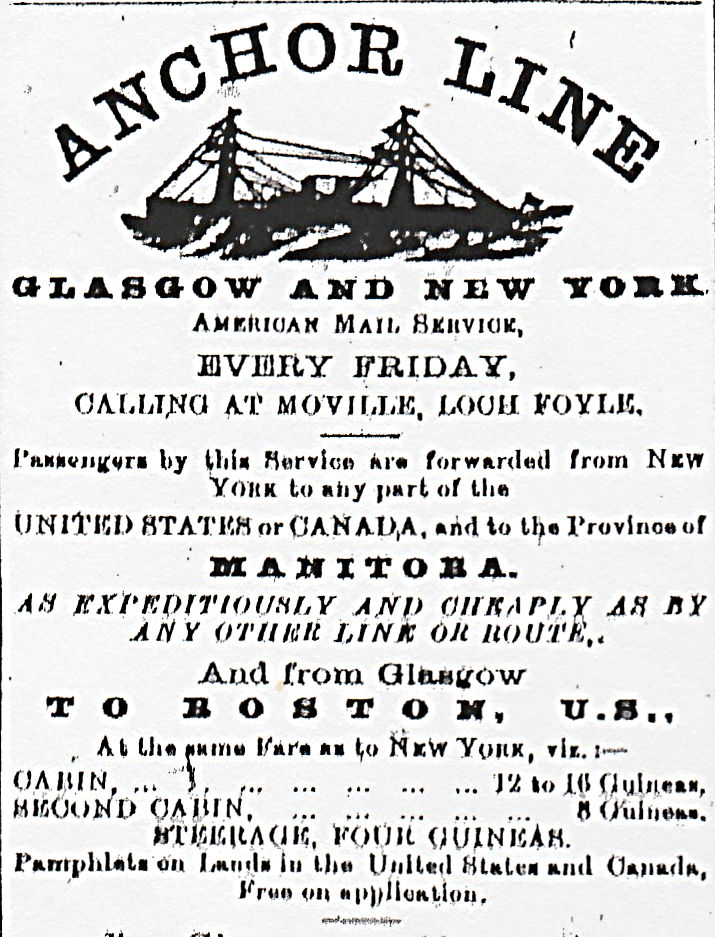From the 1841 Scottish census, Kinna families were mainly in Kirkcudbright, may be sixteen or more, with only one or two in Wigtonshire and elsewhere in Scotland. now all have left. I can trace my family back to William[1] and Mary Muir, in about 1750, and it is lightly that William [2] their eldest son, married Jean Wilson. I know little about them, or other members of his family. I have not been able to establish the connections between families but since they were all in such a small area I believe there must be a connection.
William[2] had 4 boys of which only two David[3] and Robert[3] married. David had 8 boys of which only 5 married that I know of, my line stems from David's eldist son William, who is my Great Grandfather. Of David's other boys James's branch has ended. John's branch has also ended, only Robert's branch in Canada, is still growing. Edward changed his name to McKenzie before he married in NewZealand, I have included him as he is a blood relative.
Robert[3] married Jessie McQuie, currently they have about four active or potential new branches through their son Alexander. My line from William[4], split into three, James, William and John, my grandfather. James line has finished with himself as he had no surviving sons. William had one son who in turn had one son, Mackenzie known as Ken, who in his turn had two sons. But at present there no male children to carry on the line.
My grandfather had only one son, Andrew my father. I had two sons, my brother did not marry. So from the beginning in 1745 to now there are 8 or more potential new branches in about nine generations.
The move out of the area started with David[3], and some of his neighbours, who went down to London for several years, and in fact he married there and their first child was born there in 1826. by the time that the second child was born they had returned to Blackcraig. I don't know what they did in London but assume that they were labouring, may be on the Brunel's Thames tunnel, started in 1823 and suspended in 1828 after the flooding. As a miner tunnelling would have been an obvious choice of work.

Advert from Wigtown Free Press January 1883
When William[4] started work, he too was a miner in the Blackcraig mines. By the time William's brother James was 18 he and John went to Liverpool and worked as Drapers. In 1861 Edward is also shown in Liverpool living with brother John. James had returned to Minnigaff and was living with his family in Machermore Cottage, his brother Adam was also living with them. When he returned from Liverpool he had come in to money, and did not have to work [see James 1829 from main menu]. John married and stayed in Liverpool. He lived in 19 Christian Street and had seven girls and ultimately a son. Only the first born Sybella, married, the next three died in 1870. The three remaining girls lived till their seventy's and eighty's. John died age 65, his wife out lived him by 16 years.
Edward left Liverpool and made his way to New Zealand and followed the drapery trade. He was married in 1875. I don't know when he arrived in New Zealand and wether he worked his passage or became a Seaman, but he changed his name to McKenzie. It is said he took the name of the Captain of the Ship that he was on. My father told me that the Kinna name came from Mckenzie and although I have never been able to make that connection may be there is a connection between Edwards name change and my fathers information.
Robert[3] initially worked as a miner until 1888 when he joined his son William and in USA, where he spent the rest of his days, I assume as a farmer .
The move to USA by Robert's sons in about 1879 could have been sparked off be newspaper adverts at the time, offering free land and cheap passages. Where ever they landed, they would have to have travelled to North Dakota, about 1500 miles by train and could have taken 3 or 4 days. There they settled and obtained land grants. When in 1900 when the Canadian Government offered land grants, William and family moved to Estevan just over the border in Canada, although William did not carry on farming but started the lumber business. At some time Reginald John Kinna joined William in Estevan, in 1916 he joined the Canadian Army, but it is not known if he served in France, but he did survive the war, unlike his brother William[6] who was in the 5th Lincolnshire regiment but died and is buried in Flanders
James Green[5] had two sons James Eckerdley and Kenmuir. James Eckerdley joined the the 9th Battalion Royal Scotts at the outbreak of the war. He later transferred to the 16th Battalion Royal Lancs Fusiliers as second lieutenant, and gained the MC. He was then transferred to the 68th Training Division in Etaples on the 17th March 1916.
More information on individuals may be found from the main menu.
